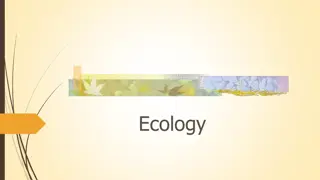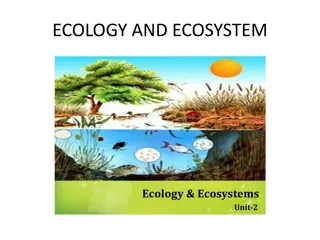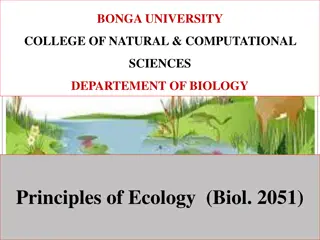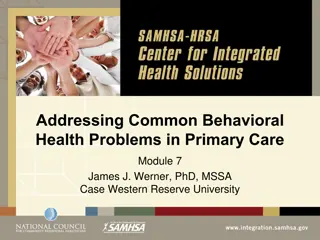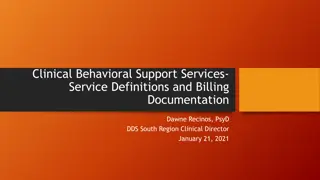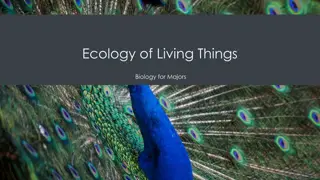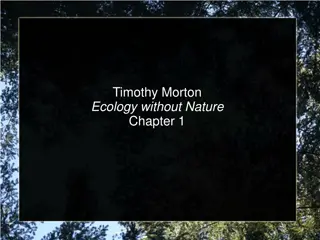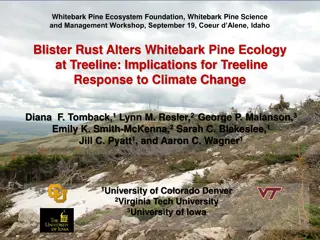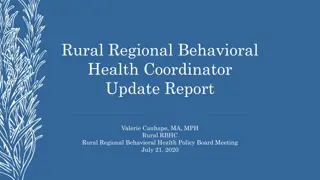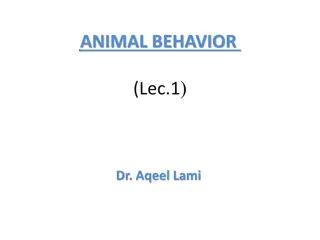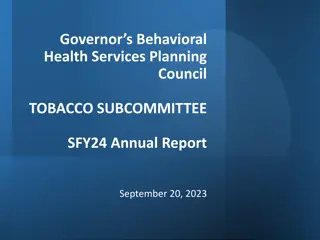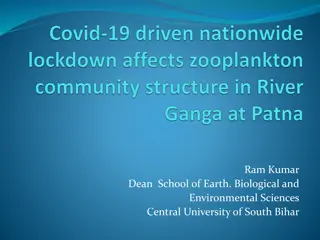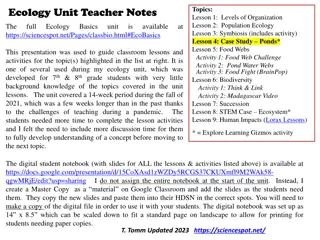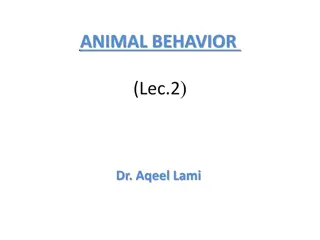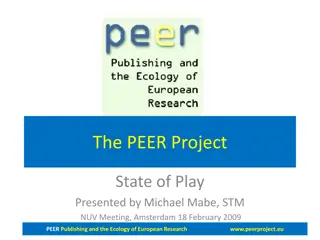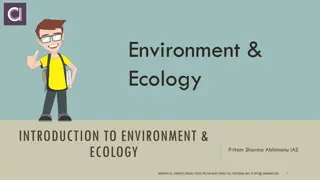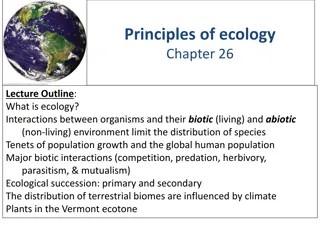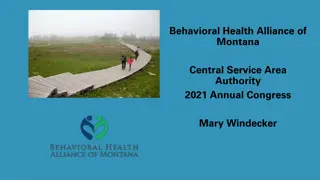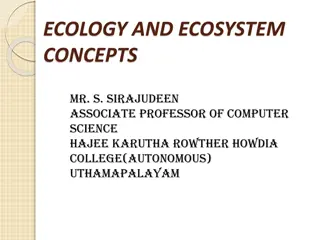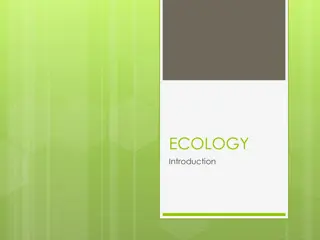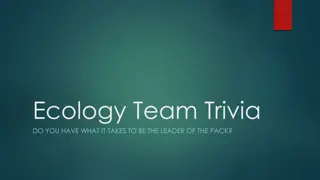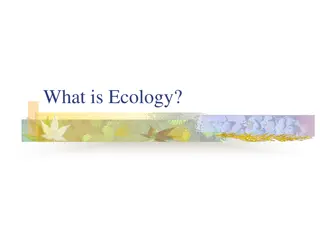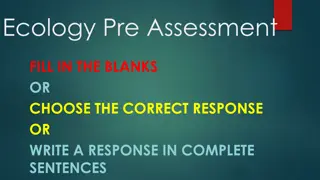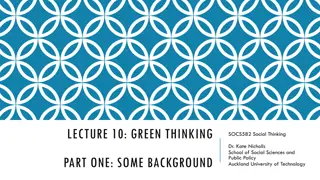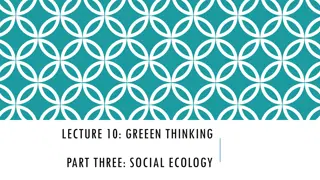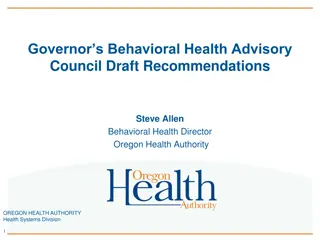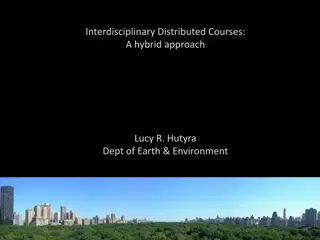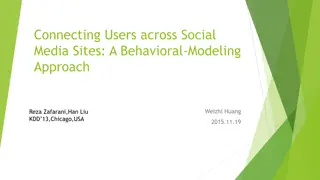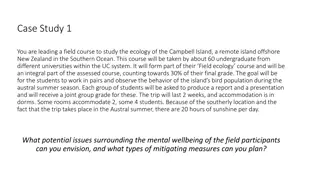Ecology: Interactions Between Organisms and their Environment
Ecology is the scientific study of how living organisms interact with each other and their environment. It delves into the relationships between biotic and abiotic factors, encompassing topics such as the distribution and abundance of organisms, structural adaptations, behavior under natural conditi
4 views • 42 slides
Ecosystems: Ecological Interactions and Dependencies
Ecology is the study of how organisms interact with their environment, influencing their distribution and abundance. This exploration covers terrestrial and aquatic biomes, energy flow, environmental impacts, adaptations, and global ecosystems, emphasizing the interconnectedness of all living organi
2 views • 58 slides
Fish Ecology: Interactions, Diversity, and Environmental Factors
Fish ecology involves studying the distribution, interactions, and abundance of fish species in different ecosystems. This lab delves into the divisions of ecology, fish species diversity in marine and freshwater ecosystems, and the environmental factors affecting fish diversity and abundance. Disco
1 views • 7 slides
Ecology and Ecosystem: A Comprehensive Overview
Ecology, derived from the Greek word "oikologie," explores the interactions between organisms and their environment. The study encompasses various branches like human ecology, population ecology, and habitat ecology, focusing on the relationships within ecosystems. An ecosystem, defined by A.G. Tans
1 views • 68 slides
Media Ecology: Impact of Communication Technology
Media ecology is a theoretical concept analyzing the influence of media and communication technology on human culture. Neil Postman, a prominent figure in the field, delves into how communication media affect human perception, understanding, and values. This study views media as environments shaping
7 views • 23 slides
Principles of Ecology: Understanding Organism-Environment Interactions
Ecology is the scientific study of how living organisms interact with each other and their environment. It involves understanding organisms at their native habitats, from individuals to ecosystems. The discipline encompasses various branches and focuses on the relationships shaping the distribution
1 views • 14 slides
Behavioral Health in Primary Care: Understanding and Addressing Common Problems
Patients visiting primary care often present with physical symptoms that lack clear biological causes, indicating the importance of considering behavioral factors. Up to 70% of primary care visits are related to behavioral health needs, stressing the significance of addressing unhealthy lifestyle be
1 views • 40 slides
Behavioral Finance in "Finance for Normal People
Delve into the world of behavioral finance as presented in "Finance for Normal People," exploring how investors and markets behave based on cognitive and emotional factors. The book covers topics such as cognitive shortcuts and errors, emotional biases, and correcting investment mistakes. It also di
1 views • 20 slides
Clinical Behavioral Support Services: Definitions and Guidelines
Clinical Behavioral Support Services are therapeutic interventions aimed at enhancing individuals' independence and community inclusion. These services involve creating positive behavioral support plans, assessing behavioral needs, providing appropriate training, evaluating plan effectiveness, and e
0 views • 11 slides
Ecology: Interactions and Environments in Biology
Ecology is the study of interactions between living organisms and their environment. It involves levels of research such as animal ecology, plant ecology, and more, while also exploring the biosphere's impact, biogeography, species distribution patterns, and energy sources like sunlight. Ocean upwel
1 views • 80 slides
Rethinking Ecology: Nature's Role in Human Society
Timothy Morton's "Ecology without Nature" challenges the traditional concept of "nature" and its interference with ecological progress in society. Through thought-provoking narratives and philosophical perspectives, Morton argues for a reevaluation of our relationship with the environment, emphasizi
3 views • 23 slides
Implications of Whitebark Pine Blister Rust on Treeline Ecology
Blister rust is impacting whitebark pine ecology at treeline locations, affecting community dynamics and response to climate change. Whitebark pine serves as a crucial nurse tree and tree island initiator in Rocky Mountain communities. The decline in whitebark pine due to blister rust disrupts its r
1 views • 29 slides
Rural Regional Behavioral Health Coordinator Update Report
Valerie Cauhape, MA, MPH, presents updates from the Rural Regional Behavioral Health Policy Board Meeting on July 21, 2020. The report highlights increased demand for behavioral health services, challenges in accessing inpatient providers, and initiatives for Behavioral Health Task Force implementat
2 views • 16 slides
Animal Behavior and Ecology
Animal behavior encompasses a range of activities such as feeding, breeding, and social interactions. Ethology focuses on studying behavior in natural environments, while behavioral ecology examines ecological aspects like predator-prey interactions. Sociobiology delves into the evolution of social
3 views • 5 slides
Governor's Behavioral Health Services Planning Council Tobacco Subcommittee Report
Tobacco remains a significant risk factor for individuals with behavioral health conditions, with high smoking rates among this population. The Governor's Behavioral Health Services Planning Council Tobacco Subcommittee aims to promote a tobacco-free lifestyle and enhance recovery by addressing toba
1 views • 17 slides
Ecology Study of Gangetic River Dolphins and Zooplankton Community Response to Environmental Changes
Ram Kumar, Dean of School of Earth, Biological, and Environmental Sciences at Central University of South Bihar, leads a study on the Gangetic river dolphins, highlighting their ecology and distribution factors. The impact of the COVID-19 lockdown on aquatic ecosystems is discussed, focusing on zoop
0 views • 24 slides
Comprehensive Ecology Unit for Middle School Students
Engage 7th & 8th grade students in a 14-week ecology unit covering topics like levels of organization, population ecology, symbiosis, biodiversity, human impacts, and more. Utilize digital notebooks, interactive activities, and exploration tools to enhance learning and understanding. Access resource
0 views • 18 slides
Animal Behavior: Insights from Dr. Aqeel Lami's Lectures
Animal behavior, as explored through the lenses of ethology, behavioral ecology, and sociobiology, reveals fascinating insights into the activities, interactions, and evolutionary underpinnings of various species. From locomotion to foraging strategies to social behaviors, the field sheds light on t
0 views • 6 slides
PEER Project State of Play: Advancing European Research Ecology
The PEER Project, presented by Michael Mabe in 2009, focuses on enhancing the publishing ecology of European research. It addresses key stages of publication, challenges around mandated deposit, and the role of consortiums in funding solutions. The project involves a collaboration of renowned publis
0 views • 9 slides
Introduction to Ecology and Environment Studies
Ecology is the study of the relationship between organisms and their environment, while the environment refers to the surroundings that influence living organisms. The biosphere is divided into the atmosphere, lithosphere, and hydrosphere. Terms in ecology include species, populations, communities,
0 views • 13 slides
Research Contributions of Professor Ole Kristian Berg in Fish Ecology and Aquaculture
Professor Ole Kristian Berg from the Department of Biology at NTNU has made significant contributions to the fields of fish ecology and aquaculture. His research focuses on topics such as biotic interactions, competitive asymmetries, conservation biology, lipid stores in fish, and the effects of hyd
0 views • 5 slides
Ecology: Interactions, Distribution, and Population Dynamics
Ecology delves into the relationships between organisms and their environment, understanding factors that limit species distribution, major interactions like competition and predation, as well as population growth patterns. This includes the influence of biotic and abiotic factors, ecological succes
0 views • 30 slides
Behavioral Finance and Technical Analysis
Behavioral finance explores irrational behaviors in decision-making processes in finance, highlighting the limitations of rationality assumptions. It delves into information processing problems and behavioral biases that can distort market prices. The consistency between technical analysis and behav
1 views • 43 slides
Harvard Forest Schoolyard Ecology Data Analysis Workshop 2016
Compilation of teacher-developed graphs and data documents from the Harvard Forest Schoolyard Ecology Workshop 2016. The documents include comparisons of tree species by plot, number of tree species, carbon biomass, and biomass distribution across different species and plots. Additionally, the analy
0 views • 22 slides
Ecology: Key Concepts and Types Explained
Ecology, a vital branch of science, delves into the relationships between organisms and their environment. It encompasses biotic and abiotic factors, studying how living and non-living elements interact within ecosystems. Biotic components include living organisms like plants and animals, while abio
0 views • 7 slides
Pathways to Excellence Behavioral Health Steering Committee Meeting Overview
The Pathways to Excellence (PTE) Behavioral Health Steering Committee Meeting held on February 17, 2015, reviewed the roles of various organizations, discussed the steering committee membership, and established domains of quality in behavioral health. The meeting focused on reporting meaningful beha
0 views • 16 slides
Behavioral Health Alliance of Montana: Advocating for Behavioral Health Providers and Clients
Formed in 2017 by the Montana Healthcare Foundation, the Behavioral Health Alliance of Montana serves as a unified voice for advocacy on behalf of behavioral health providers and clients in the Central Service Area Authority. With a focus on supporting adult and children's mental health, substance u
0 views • 18 slides
Integrated Behavioral Health Initiative for PHN Practices
The Behavioral Health Initiative (BHI) aims to develop a comprehensive strategy to address mental and behavioral health needs in the PHN regional practice network. It offers training, education, and partnership opportunities for PHN members, including free webinars, office hours, and a yearlong Qual
0 views • 4 slides
Behavioral Symptoms of Dementia in Geriatric Patients
This informational content discusses the various behavioral and psychological symptoms of dementia (BPSD) in geriatric patients, including common symptoms like depression, aggression, anxiety, and apathy. It highlights the prevalence of behavioral issues in dementia patients, their impact on caregiv
0 views • 15 slides
Ecology and Ecosystem Concepts: Understanding Interrelationships in Nature
Ecology explores the interconnections between living organisms and their environment, dating back to zoologist Geoffroy St. Hilaire's early proposal in 1859. The term "ecology" originates from the Greek words for house and discourse, emphasizing the study of organisms within their habitat. Ecosystem
0 views • 36 slides
Ecology: Interactions and Environments
Dive into the world of ecology, where organisms interact and rely on each other and their surroundings. Understand the concepts of populations, communities, ecosystems, biomes, and the biosphere. Explore the vocabulary of ecology, from individual organisms to entire biomes. Learn about food chains,
0 views • 14 slides
Ecology Team Trivia: Test Your Environmental Knowledge!
Explore the world of ecology through a fun team trivia game. Discover key vocabulary related to ecosystems, energy roles, and more. Challenge yourself to become the leader of the pack by mastering ecological concepts. Test your knowledge on topics such as abiotic factors, population dynamics, climat
0 views • 43 slides
Ecology: Interactions in the Environment
Ecology, originating from the Greek words "Oikos" and "Logos," is the study of interactions between living and non-living components in the environment. It encompasses the relationships between plants, animals, microorganisms, and abiotic factors like light, water, nutrients, and atmosphere. Studyin
0 views • 16 slides
Ecology Pre-Assessment Questions
This assessment covers topics related to ecology, including food chains, energy pyramids, organism relationships, and ecosystem components. Questions range from identifying correct food chain sequences to defining autotrophs and heterotrophs. Students are prompted to understand how energy flows thro
0 views • 29 slides
Green Thinking: Societal Perspectives on Environment and Ecology
Delve into the realm of green thinking through the eyes of social sciences in this lecture by Dr. Kate Nicholls at Auckland University of Technology. The discourse ranges from traditional Western views on nature to the rise of the green movement, including discussions on deep ecology, social ecology
0 views • 9 slides
Social Ecology and Anarchism: A Path to Sustainable Future
Social ecology emphasizes the interconnectedness between social issues and environmental problems, advocating for a society without domination or centralized control. Anarchism, often associated with social ecology, critiques hierarchy and promotes cooperation. The affinity between feminism and ecol
0 views • 8 slides
Oregon Health Authority's Behavioral Health Advisory Council Recommendations
Oregon Health Authority's Behavioral Health Advisory Council (GBHAC) is focused on improving access to effective behavioral health services for adults and transitional-aged youth with mental illness and substance use disorders. The council's recommendations aim to advance health equity, early detect
0 views • 17 slides
Interdisciplinary Distributed Courses: A Hybrid Approach Experiment in Urban Ecology
Explore the innovative approach of interdisciplinary distributed courses through an experiment in urban ecology. This hybrid model involves parallel, distributed teaching on various disciplines to address urban ecosystem challenges. The experiment utilized a 3-hour teaching block, video guest lectur
0 views • 18 slides
Behavioral Modeling Approach Across Social Media Sites
This paper explores a behavioral modeling approach for connecting users across social media sites, aiming to identify individuals based on their shared information and unique behavioral patterns. It addresses the importance of verifying ages online and presents a methodology called MOBIUS for user i
0 views • 29 slides
Ensuring Mental Wellbeing on a Remote Field Course to Study Ecology
Leading a field course to study the ecology of Campbell Island poses mental wellbeing challenges for participants due to isolation, extreme daylight hours, shared accommodation, and academic pressures. To mitigate these issues, proactive measures such as mental health support resources, stress manag
0 views • 7 slides
